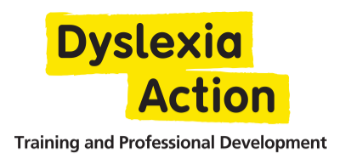Would You Credit It
 Lucy Howes
Lucy Howes
Former Head of Education and Training at Dyslexia Action provides a summary of qualifications and considers how credit and level can define and clarify the qualifications marketplace.
We are often asked about the ‘value’ of qualifications. In this article we attempt to explain some important concepts that may help when considering if the much-loved and well-used qualifications you hold are still as valid today in the field of specialist teaching and assessment as they were when you first qualified.
Continuing Professional Development
Firstly and importantly, qualifications do not date IF you keep up the specialist knowledge first gained through them with recent and relevant continuing professional development (CPD). Furthermore the skills acquired through qualifications, particularly those in higher education, transcend content knowledge in terms of the transferable skills that are applied to the workplace; these are not only retained through life but are usually built upon and further developed. Transferable skills at degree level include cognitive and intellectual skills (critical thinking, data analysis and synthesis, advanced literacy and numeracy); practical and professional skills, (researching and analysing, problem solving and decision making, planning and organising); interpersonal skills (communication, teamwork, leadership); and self-management skills (learning, improving and achieving, resilience, adaptability and drive, digital skills). These skills will be further enhanced at postgraduate level and may include others such as constructive self and peer evaluation, project management and report writing, presentation, academic writing, strategic and quality management, autonomy and initiative.
So will a one-day or short course further enhance these skills? Undoubtedly, critical self-awareness and an ability to analyse and question (the status quo and self), professional updating in terminology and content and revaluation of current and best practice can all be achieved through exposure to ideas circulated in a peer network. This may mostly be through good CPD for those whose qualifications are complete. The annual Dyslexia Guild Conference is an example of just such an opportunity where ideas abound and discussion enables all participants to reflect and improve their professional awareness. Dyslexia Action is also a leading provider of specialist teacher/practitioner and assessment CPD courses at levels 4, 5 and 7 and offer the opportunity to update professional practice.
Defining Qualifications
We are often asked to describe how specialist teaching and assessment qualifications differ. There are three important criteria that facilitate this understanding, learning level and level descriptors, and credit, all of which underpin our nationally recognised qualification frameworks.
Understanding level
Level is determined by providing reference points that enable those who undertake qualifications to understand where their programme sits in relation to other awards.

The complexity and depth of a level 7 qualification should enable the individual to critically analyse, interpret and evaluate complex information and ideas, reformulate, modify and produce change in areas of strategic activity. Level 7 or Master’s level study is characterised by sustained and intensive work. It is intellectually demanding and requires critical and deeply-applied thinking skills. It does not necessarily provide answers but enables you to arrive at solutions through intellectual challenge and application.
A level 5 qualification will develop cognitive and performance skills, based on practical, theoretical, technological and applied knowledge and facilitate progression to higher level awards. Level 5 study enables the individual to formulate responses to well-defined problems and to exercise judgement and accept responsibility for personal and group outcomes. (SEEC 2016). Inevitably it is not that simple, however level descriptors do provide a clear benchmark for course providers, learners and employers.
What is credit?
Providing a credit rating is a way of describing and quantifying the learning that has taken place. It is also a way of providing a value to a qualification based on the level at which study has taken place. One credit is allocated to 10 notional hours of learning or, as described by Ofqual (2015a) as Total Qualification Time (TQT). The notional learning hours or TQT are the typical amount of time it will take to achieve a qualification. So a 10 credit course will have taken around 100 hours to achieve or about 4 full time days of learning whereas a 60 credit course will take about 600 hours or 25 days of full time learning. This learning will of course be spread out over a few hours a week for those undertaking it on a part-time basis and in practice may take longer depending on the individual’s personal time/study allowance.
Accreditation or Recognition of Prior Learning
Most training providers and membership bodies will consider prior learning experience, known variously as Accreditation of Prior Learning (APL) or Recognition of Prior Learning (RPL) and Accreditation of Prior Experience and Learning (APEL) recognising that the diversity of qualifications and experience brings further knowledge and professional development. To use your prior learning in this way, you will need to provide a transcript of what you have studied and some detail on the content such as a course syllabus or brochure.
Accreditation
So how does the accreditation of qualifications and awards fit into the picture?
Generic bodies include the British Accreditation Council and the CPD Standards Office and are concerned with, amongst other things, standards of teaching and learning; course management and administration; learner support and advice; assessment of performance and progress; material content and delivery; technological support and accessibility.

Specialist teaching and assessment accreditation bodies include the British Dyslexia Association (BDA) and the SpLD Assessment Standards Committee (SASC); each of which have formulated a set of criteria to guide course providers. It is assumed that the criteria will ensure that accredited courses will therefore be fit for purpose and thereby ensure standards are met in terms of the practitioner’s professional competence and practice. They should however also refer to the relevant national qualification frameworks, accepted level and credit rating criteria in providing these competency standards. For most professional bodies there will be benchmark criteria that sit around undergraduate or postgraduate levels of education.
Specialist Teaching Qualifications and Awards
How does this all impact upon the plethora of qualifications that sit around specialist teaching and qualifications you may ask? A careful review of the Level and Credit Rating of a course will answer some of these questions. You can be assured that Dyslexia Action qualifications are all carefully credit-rated.
To find out more about our courses, please visit:
- Level 7 Postgraduate Certificate – Specialist Teaching for Literacy-Related Difficulties
- Level 7 Postgraduate Diploma – Specialist Assessment and Teaching for Literacy-Related Difficulties
- Level 5 Diploma in Specialist Teaching for Literacy-Related Difficulties (DIST)
- CPD Short Courses for teaching professionals at all levels



